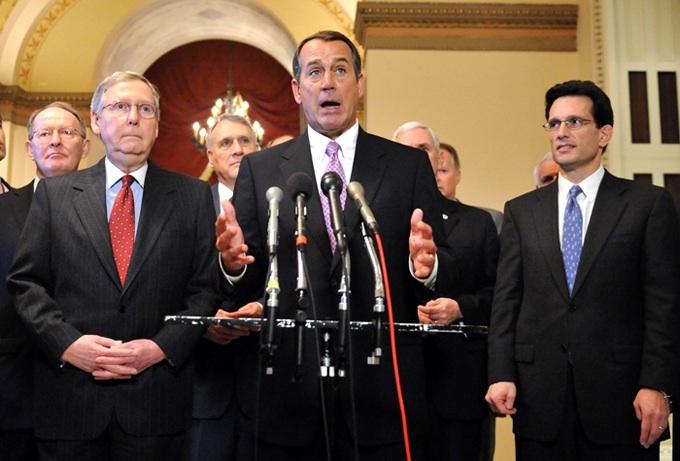Dems are happily noting the irony that Republicans have united behind a short-term debt limit increase, after publicly opposing the idea for months. Two weeks ago, top Republicans began reconsidering that view, and now House Speaker John Boehner (R-OH) is preparing to unveil a two-step debt limit bill to his caucus. The idea is to cut hundreds of billions of dollars from the budget in current legislation, raise the debt limit by a similar, modest, amount, but make raising the debt limit through the 2012 elections contingent on the swift adoption of entitlement and tax reform.
This is good flip-flop fodder for politicos, but it’s also a pretty dramatic substantive shift. Republicans have a significant public record of supporting a long-term solution — some have even gone so far as to rule out temporary steps.
Circumstances change, but now that Senate Majority Leader Harry Reid (D-NV) is putting forward a plan that meets Republicans’ original criteria for raising the debt limit into 2013, it’s worth taking a look back at the GOP’s record on this score.
The most ardent supporter of a long-term plan was House Majority Leader Eric Cantor (R-VA) — also one of the first to reconsider.
In consecutive Capitol briefings with reporters on June 13, June 21, and July 6, Cantor said the following:
In chronological order: “It’s my desire to have one debt ceiling vote,” Cantor said. “Again, the Speaker, it is up to him as to where he comes down on that question. I would like to see just one debt ceiling vote. I think we can accomplish trillions of dollars in spending reductions, and then put the necessary reforms in place where you’re actually going to achieve a lot more than that outside the budget window.”
Then a week later, “I don’t see how multiple votes on a debt ceiling increase can help get us to where we want to go,” Cantor said. “[W]e want big reforms, we want big spending cuts, and big changes to how this town works….I don’t see how multiple votes are going to help us towards that end.”
Finally, just after Independence Day, when President Obama had drawn a line in the sand on short-term fixes: “I think many of you recorded way back that the President had said one time that he was going to keep looking for something that he and Eric Cantor could agree on,” Cantor said. “I think this is that.”
There was actually a brief division between House and Senate Republican leaders on this question back in June, when Senate Minority Leader Mitch McConnell (R-KY) opened the door to a short-term plan, but his House counterparts swiftly shut this down. And McConnell himself was long on the record before and since arguing that the best solution is a comprehensive deficit-reduction package. He once claimed he would not vote to raise the debt limit if the legislation did not also include Medicare cuts, but the plan Boehner’s proposing will likely not include Medicare cuts, at least in its first tranche.
In June, House Ways and Means Committee Chairman Dave Camp (R-MI) explained a short-term deal “doesn’t give you certainty. Ideally you’d like to get that settled and not have it continually a hanging-over issue.”
The list goes on. This is one of the many reasons why Reid’s one-shot deal proposal is wrongfooting Republicans this morning.










